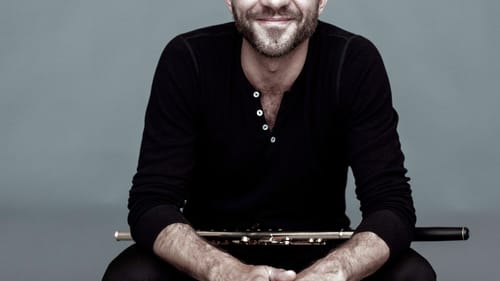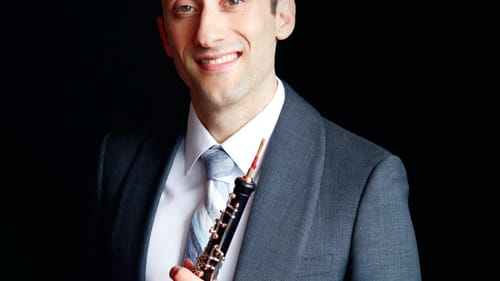Stay in the Loop
BSR publishes on a weekly schedule, with an email newsletter every Wednesday and Thursday morning. There’s no paywall, and subscribing is always free.
Mischievous Mozart?
Philadelphia Chamber Music Society presents the Omni Quartet

Four sparkling works by Mozart brightened a dull winter’s day under the auspices of the Philadelphia Chamber Music Society at the Kimmel, revealing the careful architecture under the composer’s spontaneous reputation.
The Omni Quartet, an ensemble of four string players from the Cleveland Orchestra, performed the Adagio and Fugue in C Minor, K. 546, and the complex Quartet in G Major, K. 387. They were joined by guest artists Joshua Smith (principal flute with the Cleveland Orchestra) in the Flute Quartet in D Major, K. 285, and Frank Rosenwein (principal oboe with the Cleveland Orchestra) in the Oboe Quartet in F Major, K. 370.
Never frugal with fugues
Cellist Tanya Ell set the tone for the afternoon concert with a commanding statement of the theme of the Adagio, one of Mozart’s more intense works, composed near the end of his short life. The work came at a time when Mozart was exploring fugal writing with renewed interest.
Throughout the concert, the quartet and the woodwind soloists alike concluded movements with a gentle stop like a short intake of breath between movements, when we were, perhaps, expecting a more forceful conclusion. It was as though a pastel artist had gently smudged the line between one form and another, so you could detect where the one stopped and the next started but could still feel that it was all of a piece, leading to a unified whole.

Getting your attention
Three of the quartet members joined Smith in a memorable performance of the Flute Quartet, a playful work that meshes the sonorities of flute and string players from the very first measure. Smith’s silvery sound hovered like a halo over the nest of strings, then perfectly blended in a brisk reading of the first movement. This quartet is full of surprises, not least of which is a kind of false ending to the first movement, followed by a true conclusion, designed to rouse inattentive listeners.
The second movement showcases the flute against a veil of pizzicato strings. The impishness of the first movement is gone, and in its place, a glimpse of heaven as only Mozart can reveal. The third movement is a quick rondo with a pastoral feel to it, building up to some musical hijinks before a satisfying finale.
Rosenwein shone in the oboe quartet, which is more concerto-like than the work for flute. Rosenwein’s tone was bright, clear, and unwavering, with a sure dexterity among the many tricky passageways. The oboist displayed impressive virtuosity, with full partnership in the musical conversation on stage. At times, in sync with violinist Alicia Koelz, the soprano qualities of both instruments merged into a single voice. It’s easy to miss, but at one point around bars 95 to 108, the oboist plays in common time while the strings follow 6/8. Mozart was a tricky one.

A formidable finish
The program ended with the formidable Quartet No. 14 in G Major, with its well-wrought ideas in movement one and ear-catching chromaticism in movement two. At 35 minutes, it’s long for a quartet from that time, and it's dedicated to Mozart’s quartet-writing teacher and personal friend, Josef Haydn.
With this work, the Omni Quartet came full circle in its tribute to Mozart’s mastery of the fugue. The last movement foreshadows the great C major symphony (no. 41, the “Jupiter”) to come, with its bold four-whole-note theme, GBEC# (in the Jupiter it’s CDFE) and subsequent development. It is often said that Mozart composed effortlessly in his head, while it was Beethoven who nursed along musical ideas for years, even decades, before committing them to writing. But in this work, at least, we can see Mozart the architect, building a foundation for a work to be completed some six years in the future.
What, When, Where
The Omni Quartet, with guest artists Joshua Smith, flute; and Frank Rosenwein, oboe. Wolfgang Mozart, Adagio and Fugue in C Minor, K. 546; Flute Quartet in D Major, K. 285; Oboe Quartet in F Major, K. 370; and String Quartet in G Major, K. 387. Philadelphia Chamber Music Society. January 6, 2019, at the Kimmel Center’s Perelman Theater, 300 S. Broad Street, Philadelphia. (215) 569-8080 or pcmsconcerts.org.
Sign up for our newsletter
All of the week's new articles, all in one place. Sign up for the free weekly BSR newsletters, and don't miss a conversation.
 Linda Holt
Linda Holt